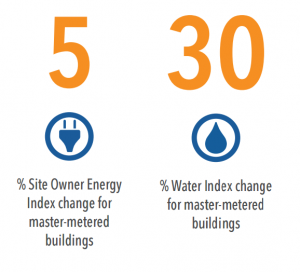New Study, EnergyScoreCards Minnesota, Shows Multifamily Full Service Benchmarking Can Lead to Energy and Water Savings
New York City-based energy management provider, Bright Power, released the findings from a 2-year pilot program, EnergyScoreCards Minnesota, to test the feasibility and impact of energy and water benchmarking in over 550 multifamily buildings across the state. The findings show that not only is statewide benchmarking feasible, the act of benchmarking can lead to significant energy and water savings in multifamily buildings. The results were released in conjunction with program funders and Minnesota Department of Commerce Division of Energy Resources, Xcel Energy, and Minnesota Housing, and local partners Center for Energy and Environment, Center for Sustainable Building Research at the University of Minnesota and Minnesota Green Communities.
EnergyScoreCards Minnesota provides one of the largest demonstrations of the feasibility and impact of multifamily benchmarking to date, with detailed documentation on methods, results, and lessons learned. The program was designed as a controlled experiment, with participants randomly divided into either a treatment group or a control group. While the energy consumption of both groups of buildings was tracked over the course of two years, the treatment group received free access to Bright Power’s proprietary energy analysis service, EnergyScoreCards, which includes software and a dedicated Energy Analyst. Participants in the control group did not have access to the service until after the second year of the study, allowing a comparison of outcomes between the two groups.
 One of the key findings of the study shows that statistically significant energy and water savings (5% on energy and 30% on water, on average) were found in master-metered buildings receiving the EnergyScoreCards service in comparison to the control group.“These findings help to show that benchmarking is not merely a reporting or compliance exercise, but rather a crucial and impactful first step in strategic energy management for real estate owners,” said Jeff Perlman, President of Bright Power. “OPOWER has shown that their intuitive presentation of energy usage information can drive savings for single family homeowners, and this pilot demonstrates that Bright Power’s EnergyScoreCards can have similar effect for multifamily buildings.”
One of the key findings of the study shows that statistically significant energy and water savings (5% on energy and 30% on water, on average) were found in master-metered buildings receiving the EnergyScoreCards service in comparison to the control group.“These findings help to show that benchmarking is not merely a reporting or compliance exercise, but rather a crucial and impactful first step in strategic energy management for real estate owners,” said Jeff Perlman, President of Bright Power. “OPOWER has shown that their intuitive presentation of energy usage information can drive savings for single family homeowners, and this pilot demonstrates that Bright Power’s EnergyScoreCards can have similar effect for multifamily buildings.”
The study also found that multifamily energy and water benchmarking is demonstrably feasible at scale in Minnesota, one of the main drivers of the study. Multifamily building owners and operators can use the information from benchmarking to prioritize energy efficiency investments, improve operations in their buildings, and deliver higher quality housing to occupants. “The multifamily sector is often overlooked in favor of the big commercial energy hogs and single-family home owners when it comes to reducing consumption. People who rent need reliable, affordable energy at home, too, whether they pay their bills directly or as part of their rent. We found that benchmarking is a critical tool for multifamily owners and managers who want to take control of energy and water,” said Janne Flisrand, Program Coordinator for Minnesota Green Communities, an initiative of the Greater Minnesota Housing Fund and Family Housing Fund.
The findings are intended for real estate owners, program designers and implementers, and policy makers using benchmarking as a tool to drive energy and water savings in multifamily buildings.
The full report can be found here: http://mn.gov/commerce/energy/businesses/clean-energy/Reports-Data/Energy-Reports.jsp
A summary of the report can be found on Bright Power’s website, here:https://www.brightpower.com/energyscorecards-minnesota/
The effort was funded by a Minnesota Department of Commerce, Division of Energy Resources (DER) Conservation Applied Research Program (CARD) grant, the Xcel Energy Emerging Technologies Grant Program, and a Multifamily Rental Energy Efficiency grant from Minnesota Housing. EnergyScoreCards Minnesota was designed and implemented by Bright Power with five local partners: Center for Sustainable Building Research at the University of Minnesota, Minnesota Green Communities, Center for Energy and Environment, and Minnesota Housing.